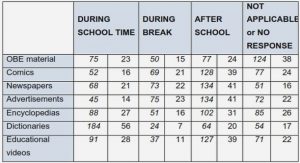Get Complete Project Material File(s) Now! »
INTRODUCTION
“The spirit of the Lord is upon me, because he has anointed me to preach good news to the poor. He has sent me to bind up the broken-hearted, to proclaim freedom for the prisoners and recovery of sight for the blind, to release the oppressed, to proclaim the year of the Lord’s favour and the day of the vengeance of our God, to comfort all who mourn, and to provide for those who grieve in Zion, to bestow on them a crown of beauty instead of ashes, the oil of gladness instead of mourning, and a garment of praise instead of a spirit of despair” Isaiah (61:1 – 3)
THE CHALLENGE TO THE CHURCH
The situations as described above are a direct challenge to the Church in this country. If the Church wants to be true to the ministry of our Lord, (Luke 4:18 – 19), it has to be the advocate of the marginalised or the poor. South Africa is one of the countries where the voice of the Church has been so vocal in fighting for the marginalised during the struggle against colonialism and the injustices of apartheid. At that time the common enemy was clearly identified as apartheid. When the political formations/organizations were banned in South Africa during the mid-1980’s, the Church stepped in to become the voice of the marginalised. Indeed the Church, under the auspices of the South African Council of Churches became such a powerful weapon to fight against the injustices of the apartheid system and the whole world supported it. One could ask a question “Is the Church still visible among the poor and marginalised today?
BACKGROUND INFORMATION
Perhaps it will be helpful for readers to understand where the country comes from as far as the issue of separate development is concerned; the situation that had disfranchised millions of people and locked them into lifeless homelands. South Africa is a country that has a long history of discrimination that was legislated in the statuette books of the then Republic of South Africa. When the National Party won the general elections in 1948, the party introduced the apartheid system of Separate Development which saw 87% of land being deprived of millions of the indigenous inhabitants of the country.
PROBLEM STATEMENT
The reality of rapid urbanization is that life is not as good as people from the rural areas perceive it to be. There is a popular saying that goes: “All roads lead to Johannesburg.” Mozambicans when they leave their country say “Hiya Johnny,” meaning, “we are going to Johannesburg” even if they go to rural areas, in Limpopo or Mpumalanga, far away from Johannesburg. The situation in which people find themselves in urban areas is completely difficult, in some cases, even worse than the rural life.
Dedication
Acknowledgements
CHAPTER 1
1.1. Introduction
1.2. Background information
1.3. Problem statement
1.4. Aims and objectives
1.5. Preliminary conclusion
CHAPTER 2
2.1. Methodology
2.2. The research gap
2.3. The relevance of the study
2.4. Preliminary conclusion
CHAPTER 3
3.1. The state economic situation post-apartheid
3.2. Unemployment and under-employment
3.3. The problems of housing and homelessness
3.4. Informal settlements and “shack farming”
3.5. Poverty in the urban areas-cities
3.6. The mushrooming of Pentecostal churches/the ministries andtheir contribution to poverty
3.7. Informal versus formal trade
3.8. Preliminary conclusion
CHAPTER 4
4.1. Introduction
4.2. The effects if rapid urbanization on family life
4.3. Poverty
4.4. Chronic Diseases
4.5. HIV and AIDS
4.6. Prostitution
4.7. Crime
4.8. Unemployment
4.9. Xenophobia
4.10. Culture shock
4.11. Rural depopulation and degradation
4.12. Preliminary conclusion
CHAPTER 5
5.1. Introduction
5.2. Economic migrants
5.3. Opportunistic migrants
5.4. Xenophobia
5.5. The influx of refugees and asylum seekers
5.6. Mozambican refugees
5.7. Preliminary conclusion
CHAPTER 6
6.1. The research procedure
6.2. The scope of the study
6.3. Statement of limitation
6.4. Statement of delimitation
6.5. Analysis of the focus group and questionnaire
6.6. Challenges to the churches and pastoral care givers
6.6.1. The prophetic ministry of the church amidst the suffering due to rapid urbanization
– Theological reflections
– Literature review
6.6.2. Suggested model for response
6.6.3. The proposed action plan programme for the Church
7. Conclusion
8. Appendices
9. Bibliography
GET THE COMPLETE PROJECT
THE TRAUMATIC EFFECTS OF RAPID URBANIZATION IN THE NEW SOUTH AFRICA AFTER THE 1994 DISPENSATION, A CHALLENGE TO PASTORAL COUNSELLING, WITH PARTICULAR REFERENCE TO INFORMAL SETTLEMENTS IN THE ROODEPOORT AREA





